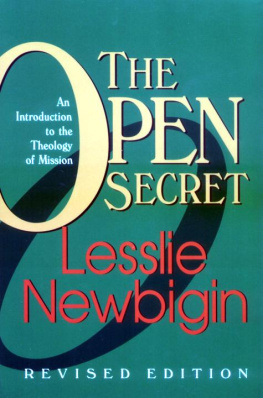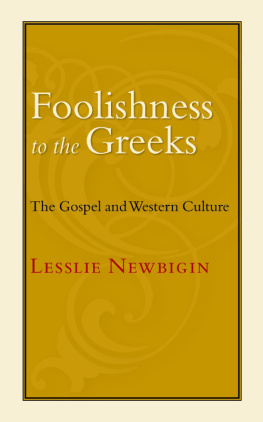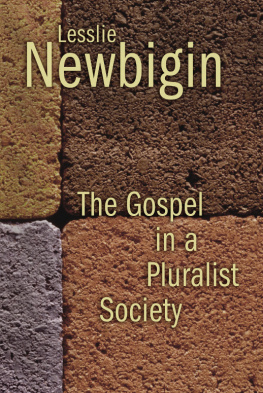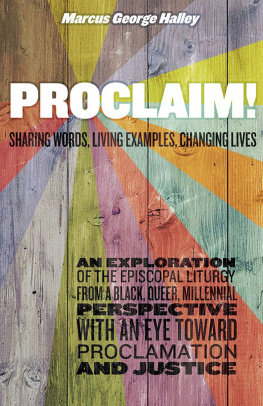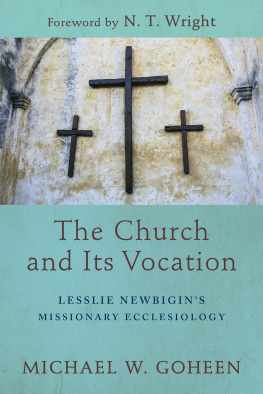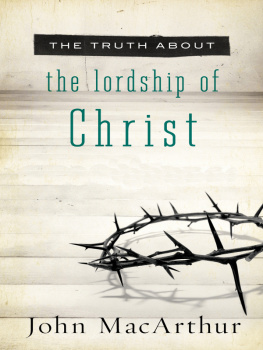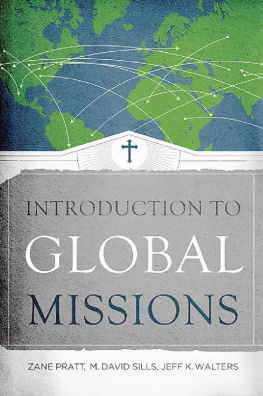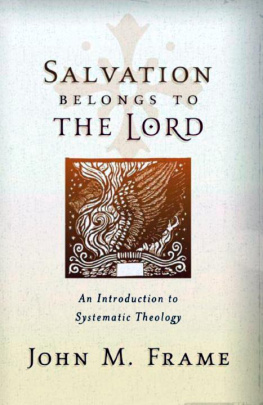THE OPEN SECRET
An Introduction to the
Theology of Mission
REVISED EDITION
Lesslie Newbigin



Contents
vi
vii
I
Preface to the Second Edition
SINCE this book has been out of print for some years, and since there has been a demand for it as a useful introduction to the study of missiology, I am happy that a second edition has proved possible. I am grateful to Dr. Eleanor Jackson for editorial help and advice in making a number of corrections to bring the book up to date at several points both of style and of substance. I hope it will prove useful.

London
January 1994
Preface to the First Edition
THE MATERIAL here presented has been developed in the course of a four-year period during which I have been privileged to lecture in theology to men and women preparing for missionary service - whether in their own countries or abroad. They come for relatively short periods. They have little time for leisurely academic study. They are facing their life work, and they want to be able to reach as much clarity as possible about the mission on which they are going. These lectures have been given in the hope of helping them to do this.
Those participating in the courses have represented a wide range of academic and practical experience. Many of them had no previous experience in theology as an academic discipline: some have had a full theological training and considerable experience. They have come from all of the six continents and from a wide range of Christian confessions.
I am conscious of the fact that these lectures leave much to be desired from the point of view of the scholar who is aware of the range of contemporary studies - biblical, theological, and missiological. I must ask the reader to remember the purpose for which and the context in which they were prepared.
The original germ of what is here presented was embodied in a pamphlet entitled "Trinitarian Faith for Today's Mission" published at the time of the integration of the International Missionary Council with the World Council of Churches. The invitation to teach at the Selly Oak Colleges has provided me with a welcome opportunity to develop these thoughts.
Because this is not a work of academic scholarship I have not attempted to furnish it with an array of footnotes indicating all the sources from which I have learned. It is indeed hardly possible to trace all these, and I must simply make the obvious remark that I am deeply in debt to countless friends and colleagues whose speech and writing have stimulated my own thought. I am especially grateful to Paul Clifford and my other colleagues in the Selly Oak Colleges for their friendship and encouragement.
Part of this material was given as a course at Princeton Theological Seminary in the summer of 1977, and I am most grateful to Dr. McCord for this invitation. I have also a special debt of gratitude to Dr. Arthur Bauer of the Lutheran Church in America, who came to these lectures and used his gracious influence to persuade me to write and Mr. Eerdmans to publish the material.
Mr. Eerdmans and his staff have been most diligent and helpful publishers, and I am most grateful for their unfailing help.
Finally I must express deep gratitude to my colleague Miss Verleigh Cant, who converted my illegible scribblings with almost flawless accuracy into lucid type, in the course of her already very busy life.

Birmingham, England
June 1978
CHAPTER 1
The Background of the Discussion
"CHRIST is the light of the nations." With these majestic words the Second Vatican Council began the greatest of its documents, the "Constitution on the Church." Fundamental to everything else that came forth from the council were the reaffirmation of the missionary character of the church, the recognition of the unfinished task which that implies, the confession that the church is a pilgrim people on its way to the ends of the earth and the end of time, and the acknowledgment of the need for a new openness to the world into which the church is sent.
This new readiness to acknowledge the missionary character of the church, to confess that "there is no participation in Christ without participation in his mission to the world," I is not confined to the Roman Catholic church. All the old established churches of the Western world have been brought to a new recognition that mission belongs to the very being of the church. "Mission," of course, is not a new word, but it is being used in a new way. All the churches of Western Christendom - Catholic and Protestant - have been familiar with missions. But missions were enterprises that belonged to the exterior of church life. They were carried on somewhere else - in Asia, Africa, or the South Pacific, in the slums of the city, or among the gypsies, the vagrants, the marginal people. In many contexts a "mission church" was the second-class institution in the downtown quarter of the city, in distinction from the well-heeled institution in the affluent quarter, which was just "the church." In some forms of ecclesiastical vernacular, a "missionary diocese" was a diocese that had not yet graduated to the full status of a diocese without qualification. Theological faculties might have provided a place for "missions" as a branch of practical theology, but it had no place in the central teaching of Christian doctrine. To put it briefly, the church approved of "missions" but was not itself the mission.
In the preceding paragraph I have used past tenses. No doubt there are large parts of Christendom where the present tense would still be applicable. However. most thoughtful Christians in the old, established Western churches can no longer use this kind of language. They recognize that, with the radical secularization of Western culture. the churches are in a missionary situation in what once was Christendom. Moreover, the struggles through which the younger churches born of Western missions have had to pass in order to graduate from "mission" to "church" have forced the older churches to recognize that this separation of church from mission is theologically indefensible. More and more Christians of the old churches have come to recognize that a church that is not "the church in mission" is no church at all. Consequently the agenda papers of church conferences are liberally sprinkled with discussions about the church's mission. For the first time in many centuries the question of the nature of the church's missionary task is a burning issue for debate within the heart of the older churches. Deeply held convictions on the subject clash with each other and - in some places at least - polarization has reached the point where anathemas are in the air. (See, for example, the *'Frankfurt Declaration on the Fundamental Basis of Mission," 1970.) This is a new situation, and it is full of promise. The present discussion is written in the hope of placing the debate in a broad biblical perspective and in the hope that to do so will release new energies for the contemporary mission of the church, not only in its global dimensions but also in its application to the tough new paganism of the contemporary Western world.

